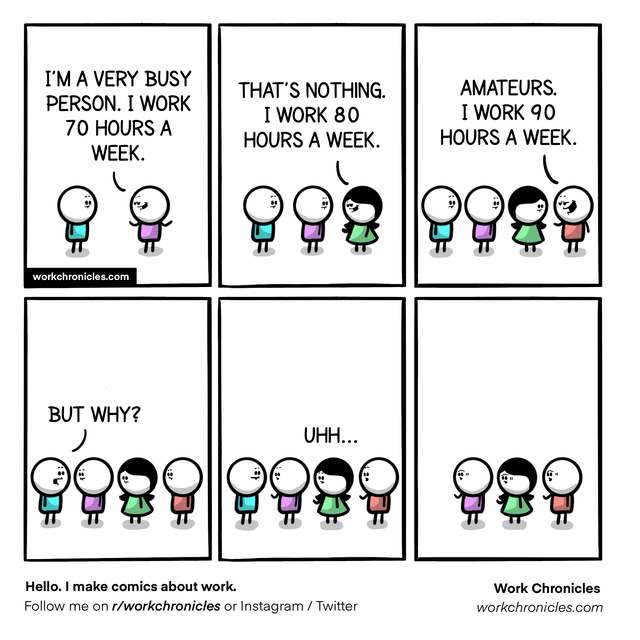Thoughts on working long hours.
This past week I worked around 55 hours (Monday through Friday) and stayed until 6:00pm on a Friday. Months-ago-me would have chastised current-me for such a sin: I'm not getting paid more for staying that late, nor will that one late Friday make a meaningful impact on my performance evaluation (in fairness, many late days probably would). Staying late can also begin to set an expectation for more hours to be worked. The Friday late work was straightforward and arguably unnecessary for me to be there. It consisted of installing a couple of electrical components to get a tool back up and running, and while two people definitely sped up the work, one person could handle it. But it was fun. The tech on shift and I were joking and learning and busting our asses to get this finished before shift change. He was appreciative for the help and staying late when he knew I had places to be. I wasn't miffed getting to dinner late and only spending 20 minutes with friends—I had just spent the entire day with friends at work.
This brings up the modern-day phenomenon of people boasting about the number of hours worked per week.
Wearing hours worked per week as badge of honor has become both commonplace and proportional to one's perceived self-worth. More hours must mean they're more valuable to the company, right? After all, if others could it they would, and then the "overworked" sla...worker wouldn't have to miss his kid's soccer games nor his anniversary. But why are people so proud about working so much when there's no requirement or urgency to do so?
Long hours signal value. The worker is important enough to the company that they're needing to work that much. Some tasks may be specific to the worker due to skill level or experience, things no one else can do. Expertise equals value and signaling is everything.
Compare this to someone who works the bare minimum 40-hour week. The company isn't begging them (read: cracking the whip) to work extra hours because they don't provide the value that 40+-hour employees do. Replaceability varies person-by-person. Some people can work 40 and be irreplaceable—the work they specialize in isn't enough to occupy greater than 40 hours. Others can work 40 in a low-skill position and be easily replaceable.
A smaller subset of this group experiences a feeling of importance that is unfelt elsewhere. They latch onto this lifeline of purpose, their raison d'être, and hold onto it, expressing it when possible to reinforce its strength and validity.

Raving about passions and sharing it with friends or even strangers is undeniably enjoyable, and for some people, work is a hobby. I'm a firm believer that having at least one creative hobby is a critical part of the recipe for a satisfying life, and double-dipping that creative hobby with work is perfectly fine (albeit not the best due to the overjustification effect, which "occurs when an expected external incentive such as money or prizes decreases a person's intrinsic motivation to perform a task").
Back in college, work was one of my few hobbies, the others being exercising and reading. I absolutely loved work. Many nights were spent in bed thinking about how fun the following day of work was going to be. I can count the number of days I didn't look forward to work on one hand.
And I unashamedly brought up the fact that I work a lot (without trying to sound douchey about it). I told people what I did and how much fun I had doing it, and while it probably made me look like a one-dimensional workaholic nerd, I didn't care. I was having the time of my life.
This is what I believe some people experience when they proudly proclaim how many hours a week they work. It's their way of saying how much time they spent on an enjoyable hobby, a way of sharing it with others that aren't in the same position.